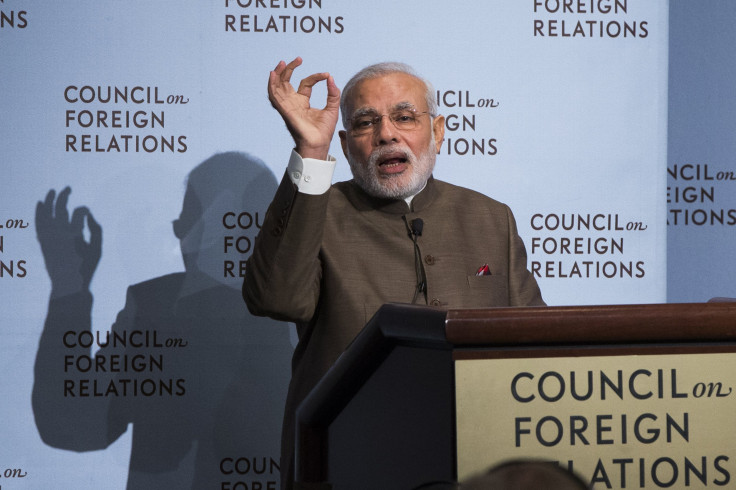Modi Promises US CEOs A Return To Market Reforms

REUTERS - Prime Minister Narendra Modi told nearly a dozen U.S. company chiefs on Monday that he is committed to liberalizing his country's economy, which has underperformed other emerging markets recently after years of breakneck growth.
Modi spoke at a breakfast with 11 chief executive officers during his first U.S. visit since coming to power in May, vowing to get India's economy back on track.
The prime minister was headed to Washington for a private working dinner with President Barack Obama on the fourth day of the visit. Modi, however, is fasting.
Among those attending the breakfast at the New York Palace Hotel were the CEOs of Caterpillar Inc and Boeing Co.
"He wasn’t at all like the politicians we’re used to here," said Caterpillar Chairman and CEO Doug Oberhelman, who shared his impressions of the breakfast meeting with Reuters.
"He acknowledged that the last five years have been very difficult for the Indian population, the Indian economy and the world in general, and he vowed and promised to change that. I believed him. He was very serious. ... I was genuinely quite impressed.”
However, some U.S. business groups have questioned Modi's reformist credentials.
Last week, the U.S. Chamber of Commerce and 15 other business associations representing various sectors gave a more cautious assessment of the prime minister's record so far.
Modi also alarmed some foes of government tinkering with business last week when he said in India that multinational soft-drink giants PepsiCo Inc and Coca-Cola Co should help increase sales by Indian farmers by adding fresh fruit juices to their fizzy drinks.
In a letter to Obama, the U.S. business groups urged the president to press Modi to remove barriers to trade when the two leaders meet on Monday and Tuesday
The letter highlighted India's blockage of a key World Trade Organization agreement reached last year, which overshadowed a July 30-Aug. 1 visit to India by U.S. Secretary of State John Kerry. The business alliance also complained about India's raised tariffs and "burdensome" new testing requirements on imported information and communication technology products.
Last week, U.S. congressional leaders on trade and finance wrote to the U.S. International Trade Commission calling for a second investigation into India’s "unfair" trade practices, detailing any changes under Modi.
In a speech at the Council on Foreign Relations think tank on Monday before heading to Washington, Modi reiterated India's WTO stance, saying that while India supported the trade pact, its demands for food stockpiles were not incompatible with it.
He stressed his campaign to encourage manufacturing in India and the country's desire for U.S. research and technology, something U.S. firms have been reluctant to share without stronger Indian intellectual property protections
India, which once seemed to vie with China for the title of fastest-growing developing economy, has stumbled in recent years as a spate of scandals undermined business confidence in the government's commitment to economic reform.
Still, Modi had won the confidence of at least one other high-profile U.S. CEO even before the U.S. visit.
Cisco Systems Inc Chief Executive John Chambers last week praised him as a leader who had "captured the imagination" of Indian business, adding that he would make the needed "tough decisions" to revive the company's economy.
One of Modi's priorities on this trip is to gather more such endorsements and - judging from Oberhelman's reaction - he won some more converts at Monday's CEO breakfast.
"I deeply believe that he’s committed to changing India," Oberhelman said.
"There’s no question that part of his mission is to enhance and increase the investment climate in India, both for domestic companies and for direct investment."
Caterpillar is the world’s largest maker of earthmoving construction and mining equipment. The Peoria, Illinois-based company operates several plants and research and development centers in India and - together with its two independent dealers - employs more than 10,000 people there.
Monday's events follow three momentous days for India's new leader.
On Saturday, Modi addressed the United Nations General Assembly, taking a jab at Pakistan over the disputed region of Kashmir. That evening, he appeared before some 60,000 people at a musical event in New York's Central Park aimed at ending global poverty and bringing essentials such as sanitation to all.
And on Sunday, the prime minister received a rapturous welcome from Indian-Americans in an appearance in New York's Madison Square Garden arena.
It was all a far cry from 2005, when the former chief minister of Gujarat was denied a U.S. visa over rioting in his home state that killed more than 1,000 people, mainly Muslims, three years before. Modi, who denies wrongdoing, has been exonerated by an Indian Supreme Court probe.
However, the issue has not been forgotten and Modi's U.S. trip had an awkward start on Friday after a little-known human rights group sued him in New York, alleging he failed to stop the riots.
© Copyright IBTimes 2024. All rights reserved.











